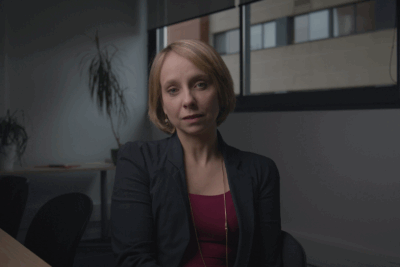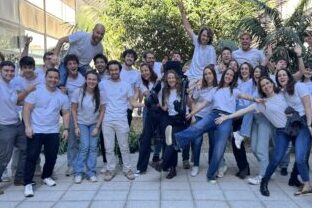9th July 2019
Make your first move in China via SHENZHEN-HONG KONG – the ‘Silicon Bay’ of China
Safety Belt to Go2China is an EIT Health Go Global Accelerator programme aiming to assist companies in the BioTech-, MedTech- and Digital Health sectors via a soft landing programme in China, Shenzhen – Hong Kong. Safety Belt to Go2China is led by E-Group and supported by IMEC and the University of Groningen. Out of the 38 applicants, 18 Biotech, Medtech and Digital Health Scale-ups and SME companies have been selected to participate in the Go2China programme’s Bootcamp in Groningen – of which 5-10 will be chosen in Groningen to join the outbound mission to China-Shenzhen and Hong Kong.

TARGET COMPANIES:
Safety Belt to Go2China targeted mature start-ups, scale-ups and SMEs with a cutting edge or innovative product/service. This programme required a business-oriented profile to participate.
TIMELINE:
- Open Call: until 15 May
- Application deadline: 15 May
- Selection of up to 20 companies for the Bootcamp: 15-25 May
- Bootcamp in Groningen (1-2 people/company may join): 9-10 July
- Outbound mission to Shenzhen and Hong Kong (1 person/company): 15-19 October
TWOFOLD SELECTION:
- Selection for the Bootcamp: By 15 May, 38 applications were received by Safety Belt to Go2China. Until the 31 May, 18 companies were selected by an expert jury, some were invited for an online pitch or conference call, for the Bootcamp in Groningen.
- Selection for the China mission: The participants of the Bootcamp will give a final pitch at the end of the Bootcamp and 7-10 companies will be selected by the jury to join the outbound mission to Shenzhen & Hong Kong. The aim of the Bootcamp is to prepare the participants for the Chinese market entry through expert trainings, seminars, by providing assistance to work on and finalise their Business Plan and Chinese Market Entry Plan in order to support their soft-landing in the second largest and fastest growing e-health ecosystem in the world. The jury will mostly pay attention to understanding the specific and detailed needs of each company in order to select and organise personalised meetings with the Chinese partners for the outbound mission
SELECTED COMPANIES FOR THE BOOTCAMP:
- Abiel srl (Italy): Abiel s.r.l. is a biotechnology company founded in 2010 as a spin-off of Palermo University and C.N.R. (National Research Council). The founders have identified a strong demand for pure, stable and well-characterised tissue dissociation enzymes for cell therapy and regenerative medicine applications. Abiel fulfils these unmet needs synthesizing and commercialising stable, highly pure and toxic-free recombinant collagenases (COL G class I and COL H class II). Abiel also provides services and R&D in the field of lytic enzymes, particularly the screening, characterisation and production of new enzymes from biomarine resources for industry. Abiel aims to become an international leader in the discovery, development and marketing of innovative value-added lytic enzymes for regenerative medicine, biopharmaceutical and industrial applications.
- BioScreen/ISORT (Hungary): ISORT was created by a team of medical entrepreneurs called Bioscreen. During a research project, they couldn’t find a robust solution for reporting and collecting data simultaneously, so they started to develop one that fits their needs. This is how the concept of ISORT was born: a modular, data focused and user-friendly data collecting and research tool. The original idea started out from research; therefore, it was a critical requirement to develop a flexible and customisable tool which does not interfere with daily clinical practice. ISORT can support various scientific projects and can be used for clinical reporting by different specialities.
- Besides the development of ISORT modules, the team behind Bioscreen performs cutting edge research and have presented their results at several international medical conferences.
- enmodes (Germany): Enmodes’s RAS-Q® technology will offer a new therapeutic approach for patients suffering from pulmonary diseases. The device is based on conventional lung support technology, but also includes the lung’s flexible movement via a patented device-integrated compliance. This results in an extremely low flow resistance, allowing for lung support without the need for a blood pump. Therefore, mobilisation of lung support patients will be possible for the first time. The RAS-Q technology is under development and not approved for human use yet.
- HydruStent & iSurgical3D(Portugal):Hydrustent provides patients with the need of temporary urological stents, who need to have asecond surgery for stent removal. Their product is a degradable stent that will revolutionise the market, prov iding lower treatment costs, avoiding second surgery for stent removal, while reducing the risk of infection and eliminating the cases of “forgotten” stents.
- iSurgical3D was born from a research project conducted by researchers at the Life and Health Sciences Research Institute (ICVS), School of Health Sciences and the Departments of Mechanical and Industrial Electronics, School of Engineering, University of Minho in collaboration with clinicians at the Hospital of São João, Porto. This project aimed to find an electro-mechanical platform based in 3D technologies for virtual modelation of implants for the correction of Pectus Excavatum by the Nuss procedure. The success of this project, whose intellectual property has now been patented, was the basis of the spirit that led to the creation of iSurgical3D, a Spin-Off of the University of Minho. Currently we are developing a strategy to extend our methodology to other human diseases, including correction of Pectus Carinatum, scoliosis and dental molding.
- Kinetikos Driven Solutions (Portugal): Kinetikos is currently supporting rehabilitation clinics, orthopaedic hospitals and insurers with our web-based clinical decision-making and analysis platform. The platform combines artificial intelligence with accurate biomechanical models with best evidence-based guidance. The benefits are both higher accuracy-of and shorter time-to decision resulting in cost-effective services. Kinetikos’ team is actively bridging the gap between research capabilities and clinical application to increase reliability of assessments and recommendations to improve patient outcomes at lower costs.
- Life Length (Spain): Life Length is an industry-leading biotechnology company working to improve the health and lifestyles of patients worldwide. Using an array of unique, patened technologies, Life Length addresses living habits and aging through telemore and telomerase measurement. Our highly scalable technologies give us a detailed look at your health and your body’s true age.
- Loren Medical Devices (Italy): Loren Medical Devices developed a PIV catheter that is less invasive and painful compared to the current PIV catheter. Loren’s PIV catheter is like the existing catheter with the patented change, permitting smaller needles to reach the performance of bigger needles; therefore, enabling it to be less invasive, less damaging, and less painful.
- Medical Simulation Technologies (Poland): Medical Simulation Technologies is an innovative advanced start-up technology company introducing to the market an innovative simulation system for TEE examination (“Teemothy”) based on CT scans from real patients. The company develops and implements medical simulators for the teaching of medical personnel. MST was founded in 2016 following five years of research and development by a team composed of medical specialists and engineers, all with an academic background and passion for innovation. Their first successful challenge was to implement the innovative transesophageal echocardiography simulator, which gives a realistic feeling of the probe operation in a patient, thanks to the technologically advanced simulator of a TEE probe and unique software based on a three-dimensional dataset obtained from computed tomography (CT) scanning of a real patient.
- nevisQ (Germany): nevisQ is a developer of smart sensor systems, which allows discreet room activity analysis. With the help of the smart sensor stripes and artificial intelligence, the activity of persons in rooms can be accurately detected and comprehensively interpreted. Their technology allows this and more, without the need of wearing any device or the use of any cameras at al.
- Notch (US-Hungary): Notch is the first company to bring true motion capture to smartphones and the only platform for motion capture-based apps that offers SDK for Android and iOS for building consumer-ready motion analysis products. Compared to other products, Notch allows scalability from one to dozens of sensors and cost savings up to ten times compared to products utilising similar principles. Notch develops sensor networks that integrate seamlessly into everyday wear. The company uses IMUs (Inertial Measurement Units) to track and capture your movements either continuously or on-demand with record / pause / stop functions. Notch is a compact mobile movement analysis and motion capture system. Notch utilises state-of-the-art sensors and reconfigurable low-power bluetooth radios which work together to pass data to your mobile phone.
- Pelvifly sp zoo (Slovakia): A telecare solution for women to train pelvic floor muscles. Our product consists of two parts. One is a tele care system with the intravaginal device, mobile app and training platform – we look for b2b partners. Second – online training to b2c.
- Pathomation (Belgium): Pathomation has developed a set of software products and services to cope with virtually every digital pathology and microscopy scenario imaginable. Pathomation’s digital microscopy solutions are based on a set of generic components, leading to very versatile products with a very open architecture allowing the highest flexibility possible. The pathomation products are vendor and format agnostic, avoiding the risk of vendor lock-in, high costs and limited flexibility for future digital pathology applications. Pathomation has real life experience with digital microscopy and digital pathology in bio banking, pathology labs, research labs, clinical biomarker research, classroom teaching, conference hosting and hosting of trainings for students in medicine, biomedical sciences, trainees in pathology and pathologists.
- RTsafe (Greece): RTsafe was founded in 2014 by medical physics professors, with considerable experience in the field of radiation oncology, aiming to address the issue of quality assurance in radiotherapy. RTsafe expanded rapidly and established collaborations with renowned hospitals and academic institutions thanks to the exceptional teamwork of its experienced scientists and software developers. Our customers’ confidence in our products and services make us feel proud and inspire us to keep thinking forward and consistently improve the quality of our solutions.
- Sleepify (Sweden): A unique worldwide patented medical device invented to cure and/or reduce neuropsychiatric disorders, dysfunctions, stress and anxiety. All innovation is evidence-based on extensive research.
- Surge-on Medical (The Netherlands): Surge-on Medical is developing stiff, steerable and cleanable minimally invasive instruments for arthroscopy and laparoscopy.
- TheraPanacea (France): TheraPanacea is developing a new-generation software solution for radiotherapy, powered by AI to significantly reduce side effects and secondary cancers.
- VitroLink (Hungary): VitroLink’s AI driven SaaS platform called PATHRONUS provides automated image and pattern analysis of tissue samples for pathologists in tumour recognition.
PHASE 1:
A TWO-DAY BOOTCAMP TRAINING IN GRONINGEN
- Prepare EU companies in the Bootcamp by providing them with training in pitching and competitiveness in the Chinese market with insider knowledge
- Develop/Finalise the participants’ Business Development- and Chinese Market Entry Plans
- Briefing a memo for potential support partners in China
- Feedback for the others and the jury members
- Chinese code of conduct and customs by a Chinese expert
- Develop and customise personalised IP strategies via e-learning tools and on-site assistance
- Identify each participating company’s specific individual needs for leveraging the support of trusted partners
- Intensive workshops, seminars, everyday pitches
PHASE 2:
SOFT LANDING PROGRAMME, MISSION TO CHINA – Shenzhen & Hong Kong
- The Soft Landing programme to facilitate market entry via high-level local embeddedness
- Local presence: 350 m2 office space (managed by E-Group) located in the best district, co–located with a VC cluster, Basis for Incubator, co-financing of a future GoChina project
- Initial market due diligence, Technology validation
- Introduction to potential Chinese clients and partners – local researchers, vendors, distribution companies, hospital networks
- Access to VCs and key decision makers “within the circle”
- Go-to-market strategy focusing on efficiency and safety (legal aid including IPR protection)
- Unparalleled commitment to protecting and safeguarding new partnerships & our Go2China endeavour
- Top level Shenzhen Government exposure
- Fast-track networking opportunities
- impact assessment and quality-control, follow-up after the programme
SHENZHEN & HONG KONG’S ECOSYSTEM SUPPORTING THE EIT HEALTH GO2CHINA PROGRAMME:
- Shenzhen’s Municipal Government: One of China’s most efficient governments. To further its goals of becoming more marketised, improving its law-based governance, and becoming more international, the city has exerted great efforts to promote numerous reforms, simplify and improve administrative procedures, and decentralise government.
- No.1 VC Fund: China’s biggest venture capital company. SCGC has registered capital assets under management of 269.19 billion RMB (USD 45 billion).
- Invest Shenzhen: Invest Shenzhen’s tasks are to promote and consolidate Shenzhen’s investment environment and business advantages, and the agency is committed to bringing in investment projects and teams of talented professionals.
- Invest Hong Kong
- Hong Kong Trade and Development Council
- The Hong Kong Science Park
- Shenzhen High-Tech Industrial Park: One of the five state-level high-tech parks particularly supported by the Chinese government.
- Shenzhen Institutes of Advanced Technology (SIAT) of the Chinese Academy of Science (CAS): Comprises five institutes and numerous other labs and facilities. SIAT was jointly established by CAS, the Shenzhen municipal government and the Chinese University of Hong Kong. SIAT aims to enhance the innovative capacity of the equipment manufacturing and service industries in the Guangdong-Hong Kong region, promote the development of emerging industries possessing their own proprietary intellectual property, and become a world-class industrial research institute.
- Shenzhen Research Institute of Big Data (SRIBD)
- Shenzhen Medical Science Information Centre
- Shenzhen University (SZU)
- Shenzhen “virtual” University Park: SZVUP “University of Universities” consists of 57 domestic and foreign universities (including HK and Taiwan), a physical campus and platform to support the cultivation of high-calibre personnel, a platform for incubation of university projects, and transformation of research achievements, as well as a platform of the National S&T Park of Universities. The Key laboratory platform of Shenzhen Virtual University Park is an open and shared technical service platform consisting of 78 state-level laboratories (Engineering Centres) and ten laboratories of HK Productivity Council as well.
- Shenzhen’s Hospital group
EIT Health and the EDIT-B consortium transform bipolar disorder diagnosis with groundbreaking blood test

Discover this life-changing project today.
Three EIT Health innovators nominated for EIT Awards

Meet our three EIT Award nominees.
Hospital Clínic study reinforces patient participation as key to digital health innovation

New work published in Journal of Medical Internet Research.